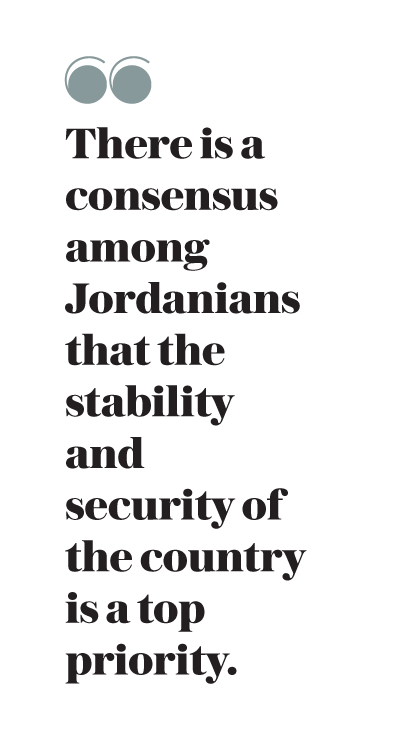
JEDDAH: The terrorist attacks in Jordan over the weekend shocked the country but the people support the security agencies in countering extremist ideologies, political analysts told Arab News on Tuesday.
The chain of events in Jordan began on Friday when assailants detonated a homemade bomb under a police car guarding a music festival in the predominantly Christian town of Fuheis, west of the capital, Amman. The blast killed a police officer.
Security forces chasing the Fuheis suspects raided a multi-story building in the nearby town of Salt on Saturday.
The militants opened fire and set off explosives, killing four members of the security forces and collapsing part of the building. Three suspects were killed and five were taken into custody.
The assailants had hoarded large quantities of explosives that were apparently intended for attacks on civilians in public places and on security installations. The explosives “were ready, on a timer, and could be detonated immediately,” government spokeswoman Jumana Ghuneimat told reporters at a press conference on Monday.
According to university professor and geopolitical analyst Amer Sabaileh, the attack in Fuheis and the subsequent clashes in the city of Salt indicated that the terrorists were currently targeting the security services.
“The explosive device planted under a security patrol’s vehicle in Fuheis did not target civilians, although there were large numbers participating in the Fuheis Festival. They insisted on sending a clear message that the target of terrorism at this stage are the security services,” Sabaileh said.
This trend indicated that there was an internal decision among the members of these terrorist organizations that the “enemy” was the security members but not civilians.
This puts the members of the security services in direct confrontation with this pattern of terrorism, which was clearly evident in other countries where the security services were targeted directly, he said.
However, this did not mean that the terrorists might not also target civilians in the future.
Sabaileh praised the timely security operation to unveil and swiftly counter the terrorist cell behind the Fuhais attack in less than 24 hours.
“The logical reading of the events of Salt indicates the high effectiveness of the anti-terrorism squad at the Jordanian intelligence department, which was able to read the facts of the Fuheis attack and identify the people and the point of their presence very quickly,” he said.
Nevertheless, he said, the high number of casualties among the security task force that responded to the terrorists requires the Jordanian authorities to revise all security plans, training and tactics.
Officials said on Monday that the suspected militants who killed members of Jordan’s security forces over the weekend were Jordanian citizens who support the ideology of the Daesh group but did not have proven links to foreign funding or foreign extremist organizations.
“It is clear that all the conferences, seminars and funds spent on strategies and plans to combat extremism and terrorism, and the establishment of a special unit (the anti-extremism unit), were in vain and had no real value, and this requires those responsible to reconsider all training programs and anti-terrorism strategies,” he said.
Hassan Barari, a professor of political science at the University of Jordan, said that there were lessons to be learnt from the recent attacks.
“First, there is a consensus among Jordanians that the stability and security of the country is a top priority. The solidarity expressed by Jordanians is a statement of a strong domestic front, and this should be reinforced by sound policies by the government,” Barari said.
“Second, there is a pressing need to nip radicalism in the bud. We all know that there are some incubating environments for radicalism in at least three sites in Jordan. Given the gravity of the situation, the government should adopt a deradicalization strategy. True, the security approach is a key pillar for this strategy; yet, it is far from being sufficient,” he said.
He underlined that many young Jordanians were susceptible to radicalization due to their perception of the weakness of the current political reality and a lack of a stake in the political order, and it was time to admit that there was an ideological component to this that could not be confronted by force alone.
On Tuesday, King Abdullah visited the General Directorate of the Gendarmerie and the General Security Directorate, where he said: “We are not worried about the security of our country’s present and future. Our society rejects the extremist ideas and those carrying it and trying to force it on our society.”












